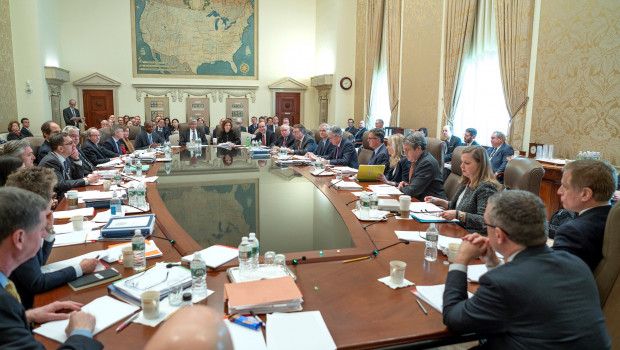Fed keeps policy unchanged, Powell says risks two-sided and avoids specifics

The US central bank didn't spring any immediate surprises on investors following its two-day policy meeting.
Banks
4,888.64
16:29 27/12/24
FTSE 100
8,149.78
16:54 27/12/24
FTSE 350
4,495.62
16:29 27/12/24
FTSE All-Share
4,453.14
17:05 27/12/24
HSBC Holdings
777.10p
16:44 27/12/24
Nonetheless, in his post-meeting comments, the Fed chairman, Jerome Powell, displayed considerable caution in his responses to journalists - leaving all policy options open.
According to Powell, no decisions had been taken regarding the exact path for interest rates. Furthermore, and while the Fed would be guided by the data, risks were two-sided, he explained.
"We will need to be nimble so that we can respond to the full range of plausible outcomes," Powell said. "We will remain attentive to risks, including the risk that high inflation is more persistent than expected, and are prepared to respond as appropriate."
Policymakers are under pressure to rein in inflation in the US which was at multi-decade highs, even if that was admittedly mainly because of a once-in-a-lifetime pandemic beyond its control.
Thus, among the risks cited by Powell were inflation remaning too high, Covid-19 and the geopolitical situation in Eastern Europe.
Powell did however say that he saw quite a bit of room at present to raise rates without hurting the labour market.
"This is a very, very strong labour market, so we can raise rates without having to severely undermine it," he explained.
On the process of normalising its balance sheet, Powell was rather non-committal, telling journalists that final decisions on shrinking the balance sheet would be taken at 'upcoming meetings'.
In an attached document outlining its "principles" for normalising the balance sheet, the Fed did say that it would start doing so once it had begun raising rates, but did not lay out a precise timeline.
Powell did reportedly say that the monetary authority could perhaps shrink its balance sheet at a faster pace than during the last economic cycle. As well, he reportedly said that relief on the supply side of the economy would be slower than hoped, although he did expect progress to be made.
In keeping with all of the above, he ruled out the possibility of greater than 25 basis point rate hikes with some market commentary highlighting that he did not dismiss the possibility of a string of rate increases.
There were however no surprises in terms of the immediate policy decisions, which initially led to a sharp rise in stock on Wall Street, which later reversed as Powell began answering journalists' questions.
Short-term interest rates were unchanged with the target for the Fed funds rate still at 0.0-0.25% and policymakers reiterating that their asset purchases would be wound down in early March, as they had previously guided towards.
Before Wednesday's announcement, some analysts had gone as far as to argue that the Fed should hike rates immediately or stop their policy of quantitative easing early, meaning February.
The Federal Open Market Committee, the central bank's main policy-making body, did however flag in its policy statement that it "will soon be appropriate to raise the target range for the federal funds rate."
That was understood to mean that rates would begin to head higher in March and in his press conference Powell said the Fed's rate-setters were of a mind to do just that.
Among the principles guiding its balance sheet normalisation, policymakers also stated that the federal funds rate was their primary means of adjusting monetary policy.
Yet the Fed's policy statement showed that they were aware that risks to the economy remained too.
"The path of the economy continues to depend on the course of the virus. Progress on vaccinations and an easing of supply constraints are expected to support continued gains in economic activity and employment as well as a reduction in inflation," the Federal Reserve reiterated in its policy statement.
"Risks to the economic outlook remain, including from new variants of the virus."